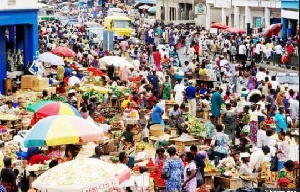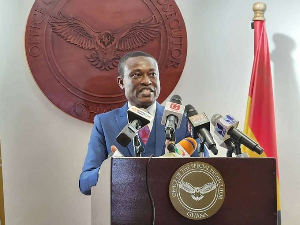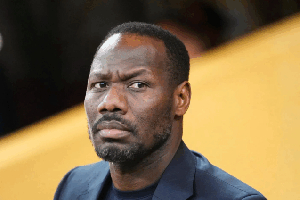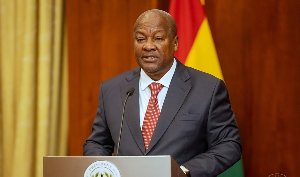The Consumer Protection Agency (CPA) has bemoaned the refusal of the trading public to reduce the prices of goods in spite of the fall in fuel prices and the appreciation of the cedi against the world’s major trading currencies.
The CPA wants traders and transport operators across the country, to channel the same speed used in increasing the prices of goods and transport fares into reducing prices currently.
In a statement issued on Tuesday, December 20, 2022, the CPA said it decided to “take a ‘wait and see’ attitude about measures put in place to mitigate the cost of fuel and the depreciation of the cedi to the dollar, unfortunately, after these measures were put in place, cost of consumer goods hasn’t been reduced as of today.”
The CPA noted that it “expects the transport unions and GUTA to use the same speed and alacrity to increase prices to reverse the prices downwards.”
It further noted the country operates a free market so it “understands and appreciates the importers & retailers and transport unions but that doesn’t give them the advantage to not adhere to the same principles when it favours them and when it favours the consumer there shouldn’t be a challenge.”
The CPA reminded businesses that consumers wield a weapon that can be used against them which is “their purchasing power” and urged them to put this into consideration in order to “encourage the free flow of commerce in the country because the worse situation is for consumers to either reduce their consumption or stop patronising their businesses.”
This, it stressed, “is not healthy for the economy.”
President Nana Akufo-Addo made a similar call to traders and transport operators a few days ago.
He said as the cedi keeps gaining in value against the dollar and other currencies of international trade, it is only fair that the Ghana Union of Traders Association (GUTA) and the Ghana Road Transport Coordinating Council (GRTCC), who increased prices when the reverse was the case, also reduce prices to reflect the current situation.
“I believe this is not only a fair request, but also a just one, and I urge all of you to join me in this clarion call so we can all have a more pleasant Christmas,” the president said on Sunday, 18 December 2022, when he delivered an address at the centenary celebration of the Ga Presbytery of the Presbyterian Church of Ghana, held at the Black Star Square, Accra.
Addressing the congregation, which included the Moderator of the Presbyterian Church of Ghana, Rev. Prof. Joseph Obiri Yeboah Mante, he stated that with appropriate policy, determination and hard work on the part of the government, things are beginning to turn around.
Transport fares are expected to go down by 15.3 per cent on Monday, 19 December 2022.
According to President Akufo-Addo, “the strengthening of the cedi has not happened by chance, but through the implementation of deliberate policies by government, in collaboration with the Bank of Ghana.”
These measures, he said, include “cedi liquidity tightening measures, resulting in the offloading of forex, as a store of value, by speculators; the improvement of forex flows from remittances and the mining sector; and the reaching of a staff-level agreement with the IMF for a US$3 billion package.”
The cedi keeps making significant gains in value against the dollar and other currencies of international trade right after the International Monetary Fund and the government of Ghana announced a staff-level agreement for a US$3-billion extended credit facility for the gold-producing West African country whose economy has been on a downward spin since the beginning of the year.
The cedi fell by more than 54% against the dollar this year.
Some few weeks ago, a dollar hovered around ¢15.
However, it started rallying in the lead-up to a joint announcement by the government of Ghana and the IMF on Tuesday, 13 December 2022 that a staff-level agreement had been reached for a three-year IMF-supported programme for Ghana.
According to the Bank of Ghana, the dollar is currently selling at ¢8.0055 from Thursday’s ¢9.3047 and Wednesday’s ¢10.4052 and being bought at ¢7.9975 from Thursday’s ¢9.2954 and Wednesday’s ¢10.3948.
Within a matter of two weeks, the cedi became the best-performing currency in the world after being the worst performer for a few months.
3-year, US$3-billlion IMF-supported deal
An International Monetary Fund (IMF) team led by Mr Stéphane Roudet, Mission Chief for Ghana, visited Accra during December 1 – 13, 2022, to discuss with the Ghanaian authorities the Fund’s support for their policy and reform plans.
At the end of the mission, Mr Roudet issued the following statement: “I am pleased to announce that the IMF team reached a staff-level agreement with the Ghanaian authorities on a three-year programme supported by an arrangement under the Extended Credit Facility (ECF) in the amount of SDR 2.242 billion or about US$3 billion”.
“The economic programme aims to restore macroeconomic stability and debt sustainability while laying the foundation for stronger and more inclusive growth. The staff-level agreement is subject to IMF Management and Executive Board approval and receipt of the necessary financing assurances by Ghana’s partners and creditors”, Mr Roudet said.
“The Ghanaian authorities have committed to a wide-ranging economic reform programme, which builds on the government’s Post-COVID-19 Programme for Economic Growth (PC-PEG) and tackles the deep challenges facing the country”, he added.
He said: “Key reforms aim to ensure the sustainability of public finances while protecting the vulnerable. The fiscal strategy relies on frontloaded measures to increase domestic resource mobilisation and streamline expenditure. In addition, the authorities have committed to strengthening social safety nets, including reinforcing the existing targeted cash-transfer program for vulnerable households and improving the coverage and efficiency of social spending”.
Additionally, he noted: “Structural reforms will be introduced to underpin the fiscal strategy and ensure a durable consolidation”.
“These include developing a medium-term plan to generate additional revenue and advancing reforms to bolster tax compliance. This will help create space for growth-enhancing measures and social spending”.
Efforts, he mentioned, “will also be made to strengthen public expenditure commitment controls, improve fiscal transparency (including the reporting and monitoring of arrears), improve the management of public enterprises, and tackle structural challenges in the energy and cocoa sectors. The authorities are also committed to further bolstering governance and accountability”.
To support the objective of restoring public debt sustainability, Mr Roudet said “the authorities have announced a comprehensive debt restructuring. Sufficient assurances and progress on this front will be needed before the proposed Fund-supported programme can be presented to the IMF Executive Board for approval”.
He stressed: “Reducing inflation, enhancing resilience to external shocks, and improving market confidence are also important programme priorities”, noting: “Accordingly, the Bank of Ghana will continue to strengthen its monetary policy framework and promote exchange rate flexibility to rebuild external buffers”.
“As part of the authorities’ debt strategy, a domestic debt exchange has been launched. The authorities are committed to taking the necessary mitigation measures to ensure financial sector stability is preserved”, the Bretton Wood institute delegation head pointed out.
He said the IMF staff held meetings with Vice President Mahamudu Bawumia, Finance Minister Ken Ofori-Atta, and Bank of Ghana Governor Ernest Addison, and their teams, as well as representatives from various government agencies.
The IMF team has also continued to engage with other stakeholders.
The staff expressed their gratitude to the Ghanaian authorities, Parliament’s Finance Committee and all the private sector, trade union, and civil society representatives for their open and constructive engagement over the past few months.
For his part, Ken Ofori-Atta told journalists that the deal, once approved by the IMF Board, will help Ghana restore economic stability, tackle inflation and strengthen the Ghana cedi, Finance Minister Ken Ofori-Atta has said.
Addressing journalists at a press conference on Tuesday, iDecember 13, 2022, following the staff-level agreement, Mr Ofori-Atta said: “Truly, the eventual conclusion of the programme will assist us in our efforts to restore stability, tackle inflation, and strengthen our currency.”
“That is why the various ingredients of the programme should be supported by all Ghanaians and all stakeholders.”
Business News of Tuesday, 20 December 2022
Source: classfmonline.com













